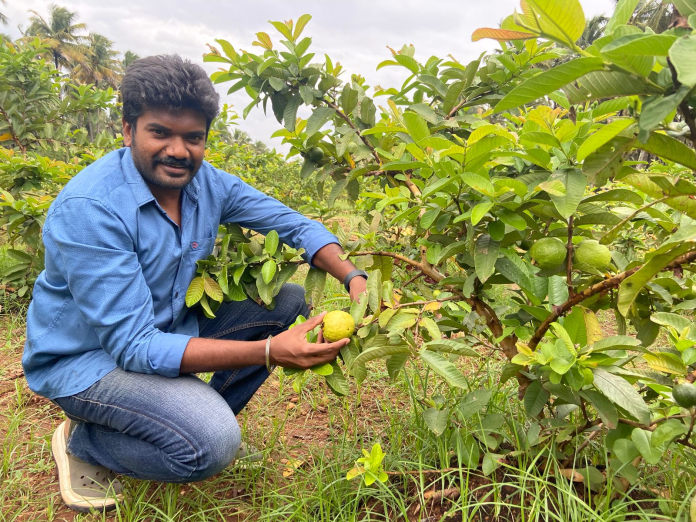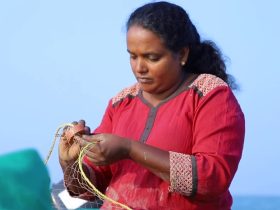Is it vital to consider the status while looking for a job? Does collar classification in the workplace matter? Here is the life and experience of a man who left his eight-year corporate job to become a farmer. J Gnana Saravanan, one of the finalists of the 2022 Karshakasree Award, is a resident of Meenakshipuram, Palakkad district of Kerala. He resigned from his HR job in 2016 and reaped gold from his land through organic farming. He desired to depart from the age-old farming standards.
Why Farming?
He had an ancestral property of seven and a half acres. He did not want to spoil the efforts made by his parents and grandparents in their farmlands when he opted for the path of becoming an IT professional. He shares his concern about the cultivating techniques that make our food products toxic and unhealthy. He aspires to serve as an example for future generations through his activities.

Main Crops
He favours intercropping in farming. He cultivates over thirty-six acres of land including that of his relatives. He has over 1,800 coconut trees, 2,500 plantain trees, 2,000 areca nut trees, papaya trees of the red-lady kind, 200 nutmeg saplings, and so on. He also has the Arka Kiran variety of guava plants. On sixty cents of his field, he grows two types of paddy, including Palakkadan Matta and the Rakthashali variety of medicinal properties.
Manuring Methods
Indian cattle are the primary source of manure on his farm. He chose Indian cattle breeds like Gyr, Kankrej, Sahiwal, and Kankayam to make his farming fully organic. His entire farming system relies on Indian cattle breeds due to their high microbial contenting manure, which makes the land fertile. The manures from the cowshed are collected in a large tank and from there to the farmlands through pipes. The slurry is again collected to produce vermicompost. He made Jeevamritham and Panchagavyam, two organic fertilisers, using byproducts from cows, including dung, urine, ghee, curd etc. Employing semi-automatic valves to pump manure into the fields reduces the need for human labour. His farm contains three ponds to collect rainwater.

Products from his farm
Gnana Saravanan sells every product in the market under the brand name “Deesan Farms’’.The papaya and guava plants produce a good harvest for him. In the future, he intends to make guava bars and juice. Every year, he receives an average of 120 coconuts per plant. From these coconut plants, he makes between fifteen to eighteen lakhs every year. From his land, he produces value-added things. He sells rice, millet, ghee, curd, and other agricultural goods under the Deesan Brand. They don’t give anything to stores. They encourage visitors to their farm to learn about farming so that they may market their products to curious onlookers. It helps people to understand the effort behind their products.

Unarvu Bharatam Course
He works in collaboration with Nallamuthu Gowndar Mahalingam Arts College in Pollachi. He offers an additional certificate programme, providing students with three months of training in the fundamentals of organic farming. He teaches the newcomers “where to start” in cultivation with this course. He conducts organic farming classes for students and workshops for farmers.
What makes him different from others is his method of intercropping, the certificate course for college students, and the technique of manuring. Krishna Sudha, his wife, also resigned from her job to support him in his mission.

When he began this journey in 2016, his father had already been growing coconut trees on his farm. He is rewriting the history of traditional farming methods along with making money. His family is happy with the progress. Saravanan’s success is a reflection of his long-term goal and careful planning. He inspires future generations to enter the agricultural field and achieve success through technical knowledge and hard work by demonstrating the benefits and profitability of organic farming.
credits and reference:












Leave a Reply